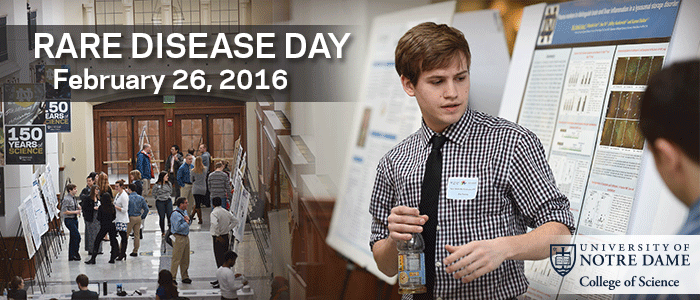
This past Friday and Saturday (February 26-27), the Boler-Parseghian Center for Rare and Neglected Diseases hosted a research symposia and community discussion on rare diseases. Over 100 researchers, families, and clinicians came together to share insights into rare diseases such as Niemann-Pick Type C, Sphrintzen Goldberg syndrome, Rett syndrome, primary lateral sclerosis, Fragile X, Angelman syndrome, Pompe disease, and others.
During the symposia on Friday, researchers shared their work in rare cancers, neurological disorders, and infections. Throughout the day on Saturday, the rare disease community shared their experiences with treating individuals, conducting research, and living with family members who have been diagnosed with rare diseases.
The Boler-Parseghian Center for Rare and Neglected Diseases director, Kasturi Haldar, and Barbara Calhoun, the center’s outreach coordinator, organized the event and shared that their favorite part of the community celebration was the “patient families’ moving testimonies of spirited determination and relentless hard work that brought hope needed to overcome complex, debilitating disease.”
The diseases that were discussed on Saturday included:
- Nonketotic hyperglycinemia (NKH), presented by patient families, clinicians and Notre Dame students
- Niemann-Pick Type C, presented by a panel
- Pompe disease, presented by John Crowley
- Morquio diseases, presented by Nicole Ingle and Roland Rebuyon, ND ‘16
- Glut1TDS, presented by Cindy and Jyl Riemersma; Jacqyln Riemersma, ND ‘16
- Idiopathic Hypersomnia, presented by Maggie Mendez and Notre Dame students
The Niemann-Pick Type C panel featured three speakers who have experienced working with individuals who have been diagnosed with the rare disease. Wendy McKenzie and Karen Quandt are both mothers of sons who have been diagnosed with NPC. They shared their experiences and journey through treating the symptoms of the disease.
Bianca Fox, ND ’13 and ESTEEM ‘14 graduate, shared her experience working on the RHE program, a collaboration of students and patient families working together to develop a database to help rare disease patients and their caregivers. Through this research she has been able to see how the disease progresses through its symptoms.
Alumnus John Crowley who presented on Pompe disease is the chairman and CEO of Amicus Therapeutics, a biotech based in Cranbury, N.J. dedicated to developing treatments for human genetic disorders. Crowley’s interest in the biotech industry began with the diagnosis of two of his children with Pompe disease, a severe and often fatal neuromuscular disorder.
Determined to find a cure and save his children, Crowley co-founded Novazyme Pharmaceuticals, a biotech start-up conducting research on a new experimental treatment for Pompe disease. In January 2005, he was then named the president and CEO of Amicus Therapeutics. Crowley and his family’s journey to find a treatment for Pompe disease is well known. The Crowley’s have been featured on the front page of The Wall Street Journal and in a book authored by a Pulitzer prize- winning journalist, Geeta Anand. Their story was also the source of inspiration for a major motion picture, Extraordinary Measures, released in 2010.
The Boler-Parseghian Center for Rare and Neglected Diseases builds partnerships among the diverse stakeholders of the rare and the neglected disease communities, including patients, healthcare providers and organizations, the National Institutes of Health, academic researchers, funding sponsors, and drug companies.

Originally published by Shadia Ajam and Marissa Gebhard at science.nd.edu on February 29, 2016.
